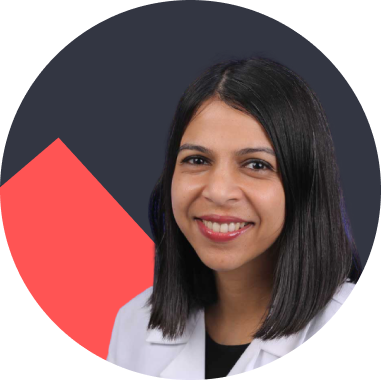Embracing a Life of Service with
Dr. Alia Chisty

A Conversation with Dr. Alia Chisty
“Don’t forget to take care of yourself and don’t forget to take care of the people around you.”
Bio
Dr. Alia Chisty is the Program Director of the Internal Medicine Residency Program and an Associate Professor of Medicine at Penn State Health Milton Hershey Medical Center. After completing her medical school from Stony Brook University in New York, Dr. Chisty completed her residency in internal medicine from Yale-New Haven Medical Center in Connecticut. Dr. Chisty is extensively involved in resident education and mentorship and has numerous publications related to designing a curriculum to improve resident medical education.
What are some childhood events that help shape your journey?
“My family is originally from Bangladesh, a small country next to India. They immigrated to the US in the seventies,” Dr. Chisty began. Being an immigrant and seeing her father struggle in the initial days, she grew up with a strong sense of gratitude. “We were always encouraged to be grateful,” she states, before going on to share how these experiences helped her envision the kind of values she wanted in her life. “It’s just knowing that hard work, good health, education, and dedication to family are the foundations for the kind of life that I wanted to live for myself.”
Dr. Chisty’s mom was a registered dietician who worked in hospitals her entire life. She grew up hearing healthcare stories, including the times her mom worked in a city hospital during the AIDS epidemic. “She would come home talking about how she had to personally feed patients who couldn’t feed themselves because they were so emaciated.” There was a lot of fear.
“It really resonated with me how important it is to care for others,” Dr. Chisty soberly remarked. She went on to share how she saw a lot of young kids who had vertical transmissions of HIV through birth and how many of them did not survive. At this point Dr. Chisty couldn’t help but tear up. “It really hurt me. I think it was just a marker of my own privilege to be born into health. And that stayed with me forever.”
How have you not turned into a “Physician Machine”, yet continue to serve from a heart of empathy?
“It’s been a matter of priorities,” Dr. Chisty reflects. “For me, I get so much meaning from the fact that I get to do the best job ever. I’m a program director. I work with wonderful people all the time. I am constantly inspired by questions and new ways to do things and thinking about how to make the experience better for other people.”
For Dr. Chisty, her life is all about service and that is why she receives so much meaning from what she does. She keeps grounded in her priorities and for her these are being a good parent, daughter, wife, and sister. Family is most important. “I’m able to feel incredible gratitude for the life that I have and the opportunities that I have.”
Is there anything you do that helps you continue to perform at a high level?
“You know, what was really helpful for me was that I am very interested in mentorship from a scholarly perspective.” More specifically, she came across a new approach to mentoring by Kathy Kram and Monica Higgins that revolutionized her approach. In an article for the Wall Street Journal, they write, “A better approach [to mentoring] is to create and cultivate a developmental network – a small group of people to whom you can turn for regular mentoring support and who have a genuine interest in your learning and development. Think of it as your personal board of directors.”
This form of mentorship is more community based. Rather than learning from only one individual, Dr. Chisty advises aspiring physicians to diversify their approach and choose several mentors from a variety of backgrounds. She challenges them to observe professionals who are doing their work with excellence and to then pursue them for specific areas of mentorship.
In her opinion, this approach has some immediate advantages. “Suddenly you’re not only focused on one person, but you a part of this huge community of people. You are a part of their mentorship networks and they are a part of your mentorship network.”
Who is a mentor that has had a positive impact on your life?
“When I was a resident or student, I didn’t realize the value of mentorship,” Dr. Chisty admits. “I thought I had to do it all on my own and even though I had great mentors I don’t think I was able to leverage those relationships or invest as much as I could have.”
She goes on, “I really do believe the mentor gets just as much out of the mentoring relationship as the mentee does. I had fantastic mentors in residency, but I don’t think I was quite there maturity wise to realize how influential those mentors were for me.” Since those early days, things have changed. Now, Dr. Chisty has developed a strong relationship with Dr. Rachel Bonnema, who is the Associate Chief in the Department of Internal Medicine at UT Southwestern Medical Center. To this day Dr. Chisty still calls Dr. Bonnema and gets her advice on navigating tough situations.
How did you overcome the discomfort of reaching out to a mentor?
For Dr. Chisty, this answer is easy. Whenever she struggles to approach someone,she thinks about what she would do if she were in their shoes. She has embraced a pay-it forward mentality. “As a PD, I hope that people are going to turn to me for help, like my residents.”
“I hope that we are able to still create a culture in which we are helping each other with no expectation.” As Dr. Chisty points out, even our mentors received help somewhere along their journey. Because this is the case, most physicians have a desire to help those who are coming along behind them.
What are the key Traits and Habits that you’ve seen in some of your most successful residents?
For Dr. Chisty, it’s a couple of things. First, it’s the belief that what you are doing is important. There is this intrinsic motivation to take advantage of opportunities. Also, recognizing one’s own boundaries and asking for help is essential. She urges people not to compare themselves to others.
In a beautiful statement that speaks to her love for others, she notes, “Don’t forget to take care of yourself and don’t forget to take care of the people around you. The most successful people somehow still find time in their day to help others.”
If there was one thing you wish you knew when you started medical school, what would it be?
“It’s just kindness, kindness towards self and kindness towards others. I really do think that that makes a difference and that will help so many things along the way.”
She concludes on this note, “Forgive yourself, forgive others. That’s just what it is. It’s so essential, and it’s so silly to think of it that way, but I really do think it comes down to kindness.”
Pearls of Wisdom
- Embrace a life of service. It is a privilege to be a physician and when we stop thinking about me and start thinking about them, life becomes better.
- Adopt a pay it forward mentality. Help others because you have experienced help yourself.
- Believe in yourself. There is a reason we got to where we are at. We must stay on this path and we can achieve whatever is necessary to bring success and fulfilment.
